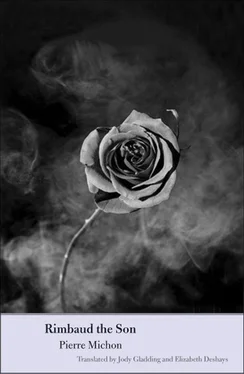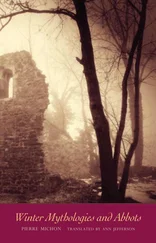They are at Carjat’s.
Carjat is a son as well, though a bit older than these five. An uncertain son, but a son. We know — the books know — that he was from a modest family; that his mother was a concierge in the back of a Paris courtyard, with silk dyers, so a very deep and narrow courtyard, perhaps foul-smelling, with rich dyes in the gutter and a bit of sky appearing very high up, as though above the edge of a well; but we do not know if he had made a well within himself on the scale of that courtyard to hold his mother, the slim catalogue prefaces devoted to him did not inquire that far: since he is a minor son. He has no golden legend. We get a glimpse of him through those of the others, Baudelaire, Courbet, Daumier, and the Old Man, because of his veneration for them, which they did not return, because of his friendship for them, which some of them returned, because of the black box as well, into which he put them thanks to the silver halides. He has his letters of nobility: he is said to have been the only artist to follow the coffin of the forsaken Daumier — the only one with Nadar, Nadar his friend, his elder, his rival, his better. That is not the source of his fame, which comes from having assisted the light, the valves that reject it, that quickly let it enter, the chlorides that fix it, when on that October day, the oval portrait came into being, eighteen by twelve and a half, of which I am going to speak, as well-known as the veil of Saint Veronica; and sometimes his own name, Carjat, is even written under the oval portrait, but below the other name, in parentheses, or in smaller letters. He did not see that portrait become so well known, he died in 1906; and in his lifetime he did not want to be known precisely for that, but for being a son, an artist; who had the presence and appearance of one; who wanted it known, that was the rule; who missed his shot because, through hedonism or despair, which can be qualities of sons, or through good sense and reticence, which are not qualities of sons, he was not presumptuous enough to pretend his practice was the universe; he did not realize in time that you must passionately embrace a single mania, an art as it is called, but only one, keep at it, fiercely shut yourself away with it, as though in a sack into the bottom of which you have thrown the mother you have, the children you will not have, all mankind, and on that great trampling you must embroider the fine work that will change you into the son everlasting. Because the work is of the race of ogres. Carjat was afraid of devouring and of being devoured: so he had pushed his mania aside a bit to make room for a wife and a little girl whom he had by her; and since his mania itself, all alone and monolithic, frightened him, he had cut it into pieces and practiced many arts; he was a photographer, of course, but also a painter and a man of the theater; and his dearest wish beyond all these appearances was to be taken for a poet, since he believed himself to be one and thus truly was one: mania, belief, desire, which may have come to him in 1848, when he was twenty years old, almost the age of Baudelaire, and had smelled the powder like Baudelaire, like him had taken the insurrection for the magic wand that gets rid of the fathers without enjoining you to become a father, like Baudelaire in those days, had soaked the red waistcoat once again, had carefully hidden it under the long black waistcoat, like Baudelaire, wrote orphan verses in the style of 1850. But unlike Baudelaire, whose friend he was, he had not seized the E string in time, in youth when it passes within reach in the banners of ecstasy , he had not seized and pressed upon it to the exclusion of all other tasks: so that, instead of pulling the black waistcoat tight and beneath it giving measure to the twelve feet, the mantras of the West, up to and including the crénom , that is, instead of being a poet, he was only an artist — a free man who had time, changed waistcoats, was not sure if the father was Nadar or Hugo, Courbet or Gambetta. He wrote verses and made photos. He was a second fiddle.
He sees the five Mallarméan miters in the courtyard under the sun and below them the flowing manes.
He was waiting for the sons, he welcomes them. He is also a tall strapping man, like Rimbaud (and for a moment it occurs to us that they had a certain style, three months later in the heart of winter, the day when they had a set-to in the old 1830 manner at the Vilains bonshommes, when Rimbaud wounded Carjat with the mythological swordstick). And indeed Rimbaud is pushed to the front and they shake hands, Carjat has been told by someone or other that today he must do a portrait of this very young man who makes beautiful poems and whom he does not know. And since he also knows that this budding genius is an awkward character, the host is immediately very affable, he wants to put him at ease for the photo, as is his habit. We do not know what they said in 1871. The opera hats are on the large hat peg by the entrance, leaning this way and that, another one perched on top. Perhaps they have a glass of wine. Carjat remains standing. Rimbaud must be seated, and he says nothing — but if we were there, we would clearly see that these preparations, the clothes, the Sunday delegation, the host’s ease, annoy him: he is thinking of the armband and the kepi, when, by an impossibly slow train, a tired photographer turned up in Charleville, and your mother leaning over your arm checked the unlikely scrap of clerical lingerie, added pins and puffed out the lace. Rimbaud blushes. And underneath, below that ancient shame, that ancient love, he is afraid and sulks hard: because this time the photographer is not an insomniac vagabond just off a local train, he is a Parisian, a master. He has photographed Baudelaire.
Leaning over him, the master observes him.
There are the two sons, face to face: the one who has so far only written Hugoesque verse, but perfectly Hugoesque, and whose destiny is toppling, because he has seen all the men of the Parnassus and suspects that to be poetry in person is not to be first in the Parnassus or anywhere else, that it cannot be ratified; because above all he realizes that poetry descends, like rue Notre-Dame-de-Lorette, it is a slope come tumbling down that leads you to a hotel in Brussels — or to Guernsey before the séance tables, sovereign, magic, charlatan: the slope goes to Guernsey, if you are very lucky. Before that slope he hesitates. There is the one son, and the other, leaning over him, the photographer, who knows he is important and does not really know why, who thinks it is because he is an artist — whereas he is a pure agent of Time, irresponsible and fatal as Monsieur de Paris . He looks at his model. He sees that the tie is crooked: he sees what color it is, which we do not know. The waistcoat is red or black, that will not show, the photo is black and white. He tells himself that soon the tie must be straightened; and then no, this young man is a poet, it is right for the ties of poets to be crooked. On the hat peg by the entrance the hats gleam in the darkness. Rimbaud says something, something obscene no doubt because they laugh, everything blurs, in their black clothes they move in a little sunlight, they are standing. With a single movement they are all there in the studio.
October falls through the glass roof, the light is strong and blue. Surely the wind has picked up outside, the sky is even larger. There are tall plants in pots, the light brightens and burns them as well, more slowly than it does the silver chlorides, but with the same passion. The enormous camera is waiting on its tripod, in its wagon bellows. And that cannon on its stand, exactly crowned by its cylinder: great gleaming pieces of yellow copper and black Bakelite fitted together. Then the platform, the stool, the dark cloth behind. Rimbaud is sitting where Baudelaire sat. The second fiddles against the wall are facing him, they are giving their opinions — each one is hoping that his is the opinion of a first fiddle. Carjat comes back with the plates, he has taken off his jacket. He uncaps the cylinder. He is under the black hood. Rimbaud has written Le Bateau ivre , as if he were going to die, that is where his thoughts turn, even if Le Bateau ivre is not exactly poetry, even if he has filed it as smooth as possible for the Parnassus, nevertheless, he has done it. The axis of his neck stiffens. The sky above fills with brass. The golden leaves slide over the shining glass. Between him and the armband, between him and the well, cascade the hundred lines of the Bateau ivre . He launches into the opening, he descends the impassible rivers, then he runs, then he dances; his lips do not move; his mother rises. She is leaning over the scrap of cloth, she has written the definitive hundred lines of the Parnassus, she sobs and falls, she rises again and triumphs. She sinks and rises like a cork in water. From under the black hood Carjat says to move his head a little, this way, then that way. He does as he is told, in the head that barely moves fall the impeccable stanzas, the impassible stanzas fall line over line, like waves, like the wind. The hemistichs topple, the syllables flow twelve by twelve over the country girl, she cries and laughs aloud. She has written that. She has brought down the Parnassus. The sky above is as grand as a father. For a long time Rimbaud has held his breath. Carjat shoots. The light rushes over the halides and burns them. At this moment Rimbaud longs for Europe.
Читать дальше












